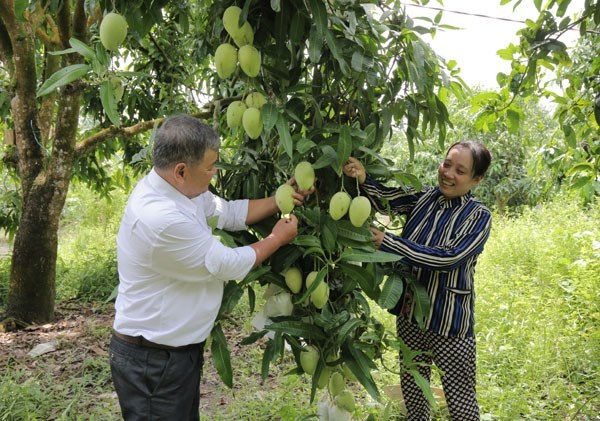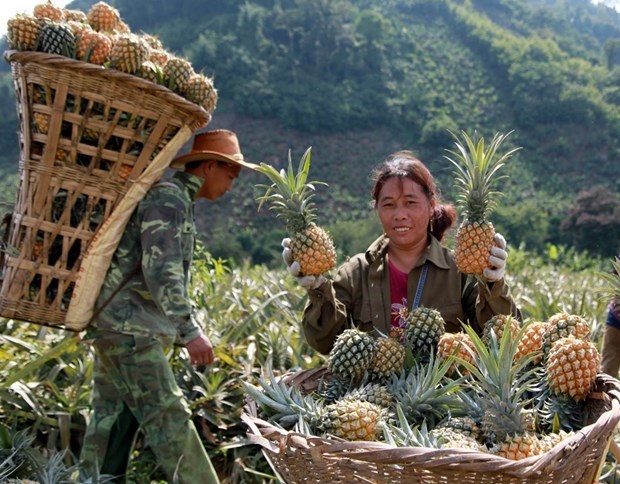Capital convergence helps boost poverty reduction
 The Party Committee in Tinh Thoi commune, Cao Lanh city of the Mekong Delta province of Dong Thap, has regularly sent officials to localities to encourage the poor to borrow capital for household economic development (Photo: Contributor/VietnamPlus)
The Party Committee in Tinh Thoi commune, Cao Lanh city of the Mekong Delta province of Dong Thap, has regularly sent officials to localities to encourage the poor to borrow capital for household economic development (Photo: Contributor/VietnamPlus)Hanoi (VNA) – The policy of concentrating trusted capital from the local budget to support the poor to the Vietnam Bank for Social Policies (VBSP) has generated a motivation boosting the country’s economic development.
Inspired by ideas of some provinces like Quang Nam, Thai Nguyen and Dong Thap, many localities have trusted the VBSP with the local budget for lending to the poor and other social beneficiary groups.
The coordination among the National Assembly, the Government as well as ministries and sectors in converging capital to one point and completing the policy system has created a foundation for a breakthrough step in reducing poverty, ensuring social security and building new-style rural areas.
From a creative solution and outstanding determination
Being aware of the significance of local resources to socio-economic development and poverty reduction, the central province of Quang Tri has increased the amount of trusted capital transferred to the VBSP every year, and always provided the capital right from the beginning of each year.
Particularly, in 2019, provincial departments and sectors have advised the provincial People’s Committee to focus on resources from ODA and non-government projects, converging all the capital to one point which is the VBSP for management and lending. This is a creative and effective solution to mobilise financial resources from and out of the provincial budget, thus creating strong capital sources for lending.
One typical example was the Happiness Programme in Quang Tri, which is funded by the Korea International Cooperation Agency (KOICA). The provincial People’s Committee has assigned the VBSP in Quang Tri to collect payment for the projects. The bank has opened accounts for borrowers with an amount of nearly 65 billion VND. So far, the bank has received nearly 7 billion VND in debt payment.
Director of the VBSP in Quang Tri Nguyen Duc Dong said that many projects lent money to beneficiaries, but when they concluded, the management boards of some projects had returned to their home country and failed to recovery the capital. Therefore, the reclaiming of capital from the projects helps the province evaluate their effectiveness and learn lessons regarding investment methods, while increasing resources for the locality itself to support locals in building sustainable livelihood.
Quang Tri aims to lure resources from society for poverty reduction. It has convinced two firms to deposit 600 million VND in the VBSP without enjoying interest rate so that the money can turned into loans for poor households.
Concentrating all sources of locally entrusted capital in the VBSP and allocate the resources in line with projects designed by the province and districts to suit the reality has motivated the sustainable economic growth in the locality, he said.
Meanwhile, the northern mountainous province of Lao Cai has built a special policy for Si Ma Cai district, where 95 percent of the total 7,234 households are from ethnic minority groups and all 13 communes are extremely poor. Under the policy, the province helped locals in the district to borrow capital from the VBSP for breeding by paying loan interest for them.
The Party Committee, People’s Council and People’s Committee of Si Ma Cai have also agreed to transfer the local budget for poverty reduction to the VBSP with over 28 billion VND trusted to the bank in the past five years. This has helped raise the total outstanding balance of the VBSP in the district as of the end of 2019 to 220 billion VND, 90 billion VND higher than that in the end of 2014.
As of December 31, 2019, capital transferred from localities to the VBSP for supporting the poor and other social policy beneficiaries increased by 11.6 trillion VND to over 15.4 trillion VND, with average growth of 29.4 percent per year.
 Poor households in Si Ma Cai poor district have enjoyed loans to create sustainable livelihood (Photo: Contributor/VietnamPlus)
Poor households in Si Ma Cai poor district have enjoyed loans to create sustainable livelihood (Photo: Contributor/VietnamPlus)Resources concentrated
Social policy credit has been promoted by the determination of the Government and the coordination of ministries and sectors. In its resolutions submitted to the National Assembly for approval on middle-term public investment in the 2016-2020 period and other yearly public investment plans, the Government has paid much attention to the allocation of capital to the VBSP to implement credit programmes.
The inclusion of social policy credit into State budget investment plans for the first time has helped the VBSP increase its financial capacity and reduce pressure on its lending resources.
After five years of implementing the policy of trusting local capital to the VBSP, 77 trillion VND has been added to social policy credit, including over 10 trillion VND from the State budget, over 41 trillion VND from State-owned commercial banks and more than 21 trillion from organizations and businesses.
Nguyen Van Binh, head of the Party Central Committee’s Economic Commission said that at the recommendations of the SBV, ministries, agencies and the VBSP, many new credit policies have been issued, including loans for households that just escape from poverty, employment loans, loans for the poor to build disaster-proofed houses and for forest protection and development.
Le Minh Hoan, Secretary of the Party Committee of Dong Thap province commented that the completion of credit policies and enhancement of loan limit have helped many poor households get rid of poverty, while increasing the confidence of vulnerable groups in the society in boosting production, engaging deeper to the higher added value chain./.













